There's an irony in gaming. Ask most gamers what they enjoy most about gaming and the word freedom comes up quite often. Games give you a sense of freedom to be something you can't be in real life, and do something you can't do in real life. It's everything that reading enthusiasts say about the magic of reading, but in a much more interactive format that appeals to more of your senses. Now if you ask one of the anti-gaming doomsayers what they like least about gaming, they will often claim that it makes gamers more rebellious, more counter-culture, more anti-establishment.
The irony in all of this is that when you really break it down, video games are mostly about following the rules, doing what you're told, and conforming to expectations. When you're playing GTA and running from the cops while fleeing the scene of a bank robbery, you're not doing it because you're breaking the rule that says don't rob banks, you're doing it because in the GTA world, getting the bank robbers away from the cops is what you've been told to do, what you're supposed to do, it's the rules that you are following. Portal is a game that at least creates the illusion of breaking this. In Portal, following the rules and doing what you're told can have detrimental results.
To start with, Portal plays like a long tutorial divided into 19 sections of increasing length and complexity. You start off by learning the basic controls, typical FPS movement, and then move on to the unique mechanics of the portals and how they bend reality. It's pretty disorienting at first, but after a few minutes you start to wrap your brain around it and it starts to feel more natural. You're lead through all of these by the disembodied voice of a helpful A.I. that monitors your progress through security cameras placed throughout the areas. Once you've gotten the basics down, you are given a portal gun so you can create your own portals, and this is where the puzzles start to get more complex.
Yes, even though it's a spin off of the Half Life series, and has that same FPS look and feel, Portal is a puzzle game. It's a game that forces you to think, and rewards creativity over twitch reflexes. There are enemies in the game, in the form of automated turret gun robots, but unlike traditional first person shooters, you can't attack these turrets directly, and instead have to find interesting ways of disabling them such as creating a portal below them to make them fall, or above them to drop something onto them. Even in combat, everything in Portal is a puzzle.
I mentioned that the game is arranged like a tutorial, and for the most part it is. Each level introduces something new, and gives you clear instructions on what is expected of you, with the simple promise that you will be presented with cake at the end of the last challenge. At certain points however, all of this starts to break down. The clean white automated testing environment holds dark secrets. Every so often, a malfunctioning door or other piece of equipment gives you a fleeting glimpse into a different world. Others have gone through these same tests before you, and some have escaped only to live in the walls and corridors between the levels. Although you never see these people, you are presented with their mad writings they left behind as they were driven further and further into insanity. Throughout all of these chaotic scribblings, there is one phrase that stands out above all others: "The cake is a lie"
Now of course, it's just a game, and neither world is actually real, but as you transition mentally from playing the friendly tutorial game to the dark and dangerous game of escaping from within the confines of this advanced complex of a sinister organization, it feels like an awakening. It causes you to question the trappings of your own life and wonder what is real, and what is just imaginary cake.
A lot of this power comes from the stark contrast in the presentation of each of these worlds. The clean tutorial sections, while realistically textured, shaded, and rendered, use very few polygons. Everything is very simple geometry with bright friendly textures. The behind the scenes world uses a much more realistic visual style. Things are dirty, rusty, and worn out. Nothing looks safe or inviting, and you may even question your decision of ignoring the warnings of the friendly A.I. voice that constantly tells you that you are going the wrong way and you should come back before all of the cake is gone.
Portal isn't a very long game, and if you have a free evening you might even complete it in a single sitting. It presents you with additional challenge modes at the end to enhance the replay value, but it's the main story that makes it truly shine as a modern classic. If you haven't played it yet, you should. Even if you don't normally like puzzle games, it's worth picking up a copy during the next Steam sale just to experience what everybody else is talking about.





.jpeg)



No comments:
Post a Comment